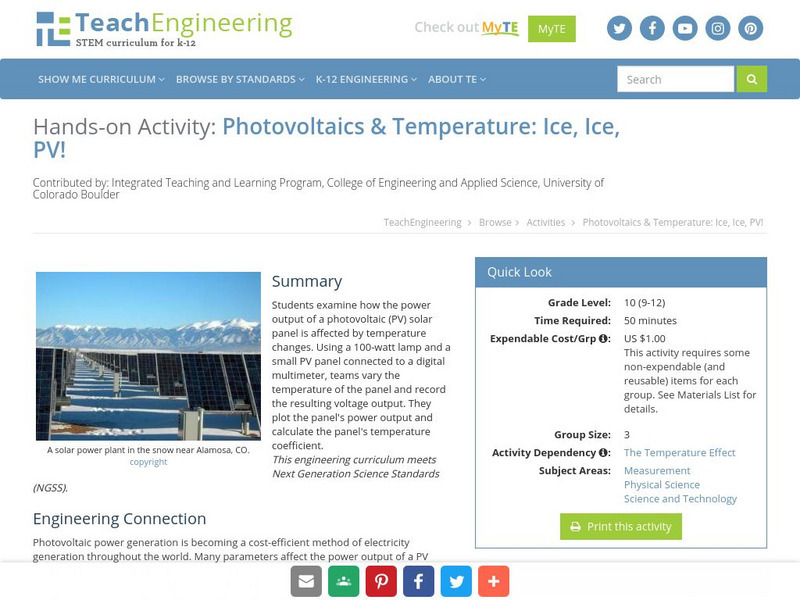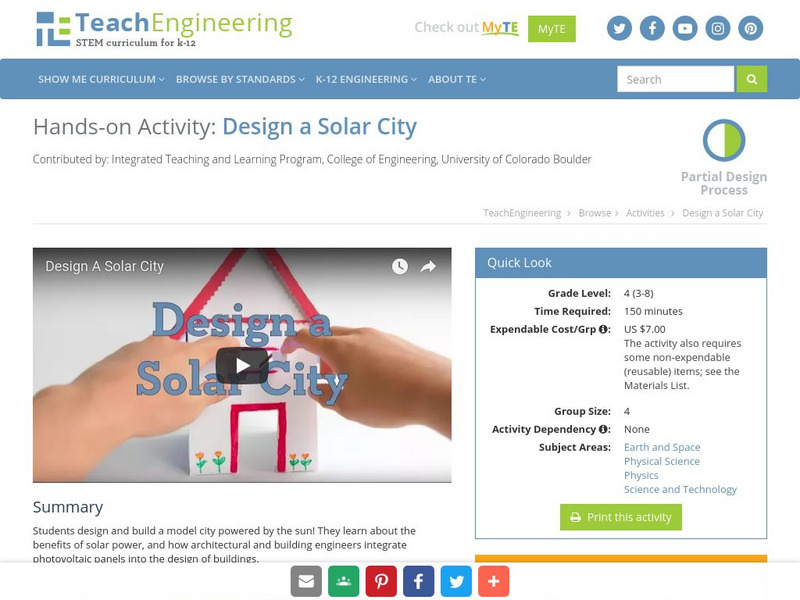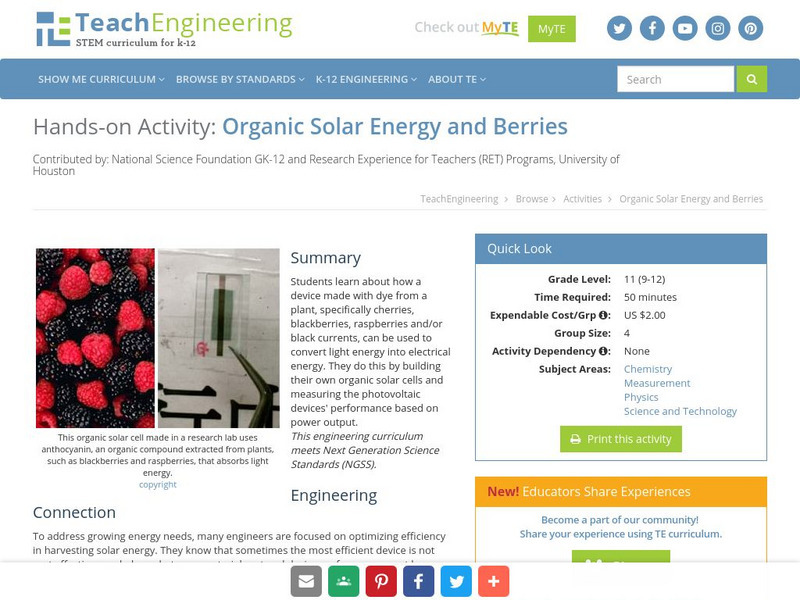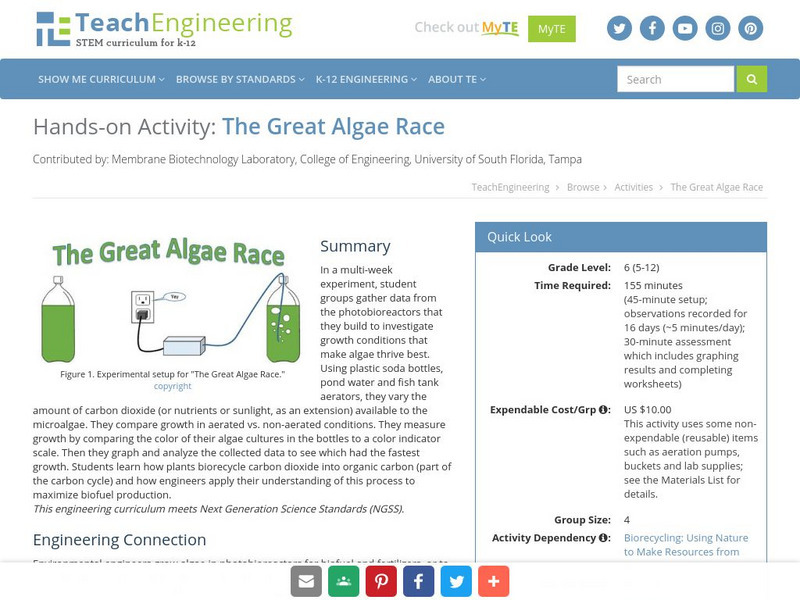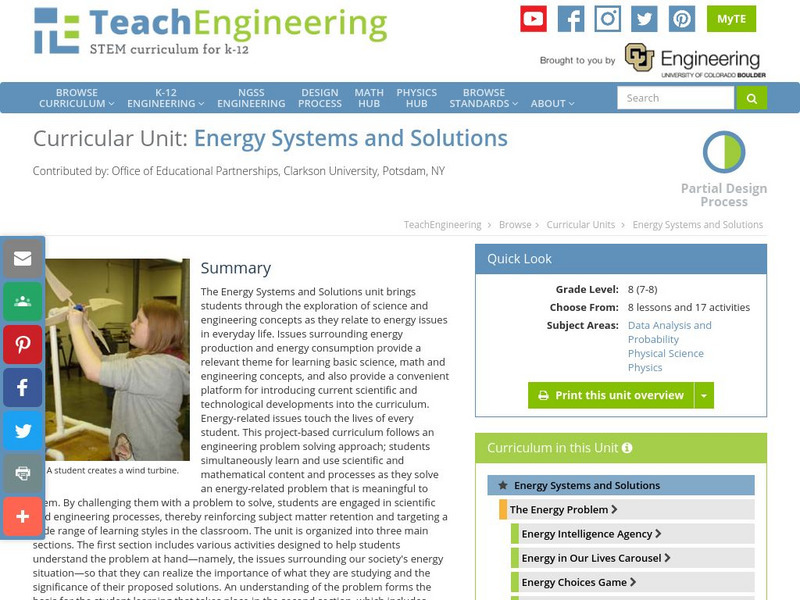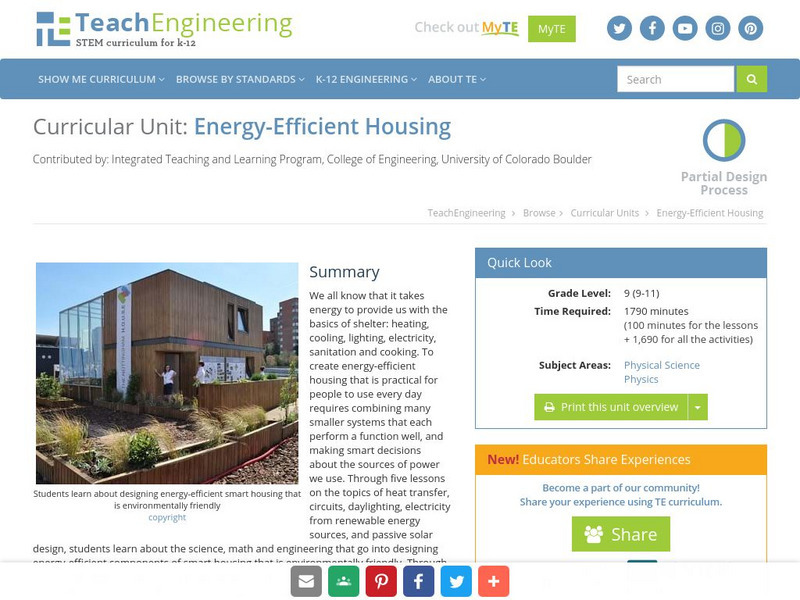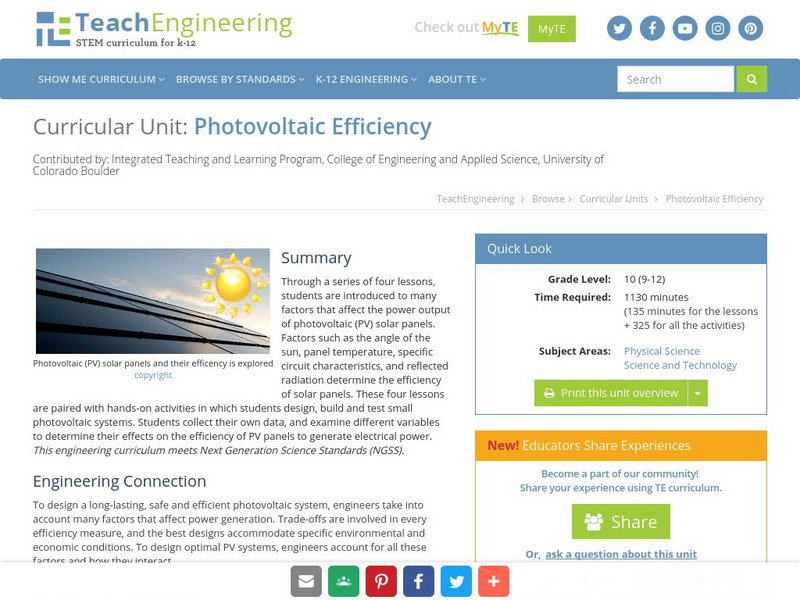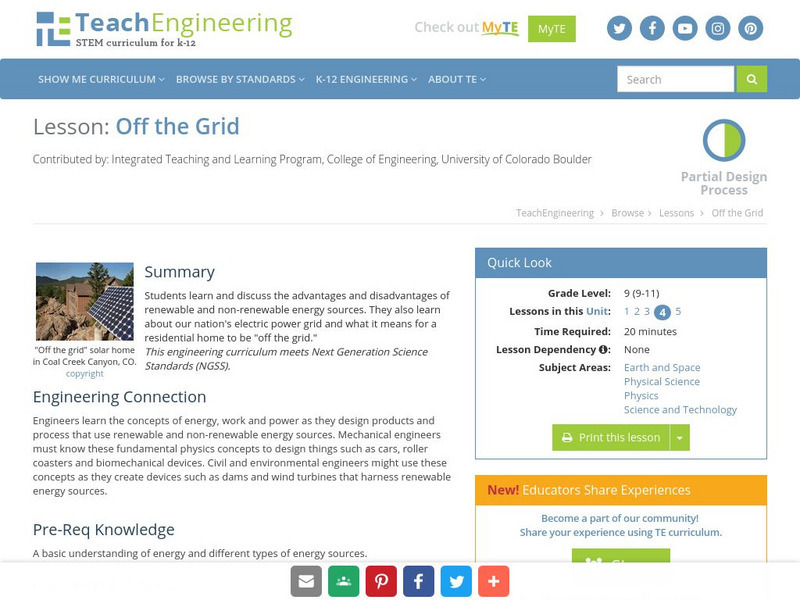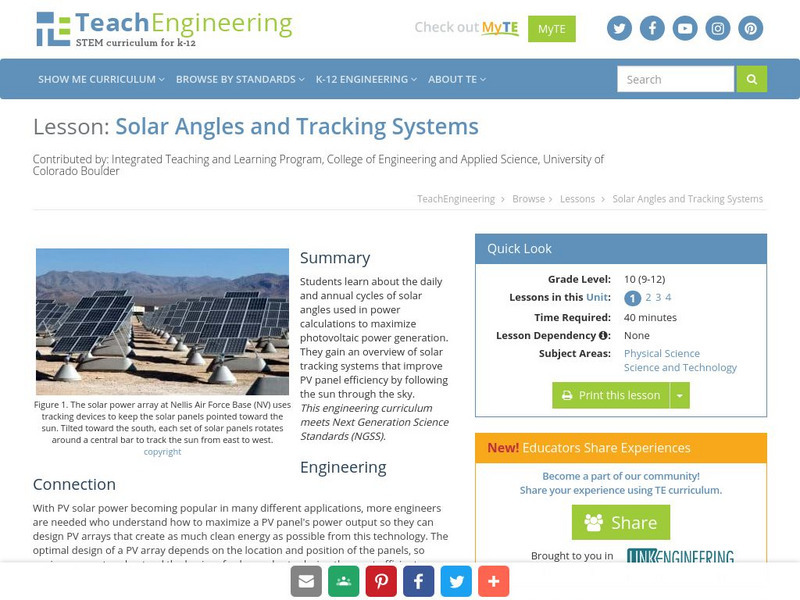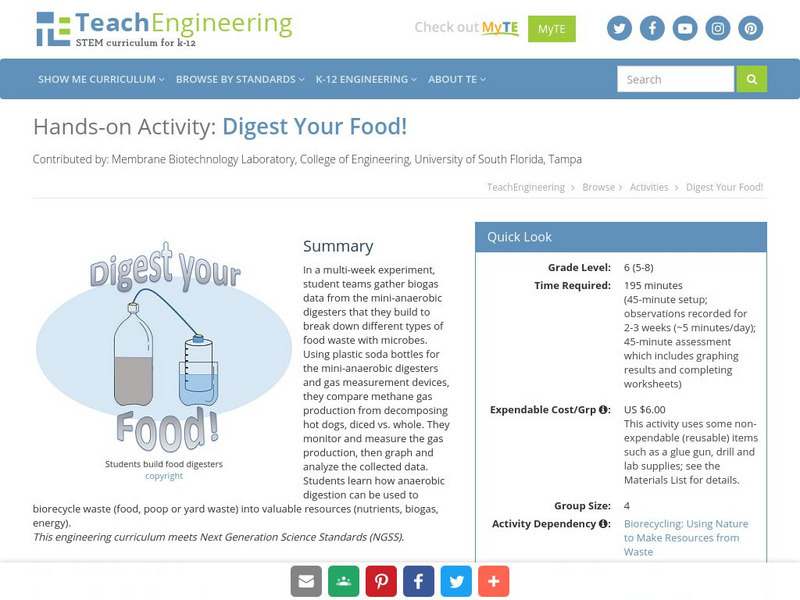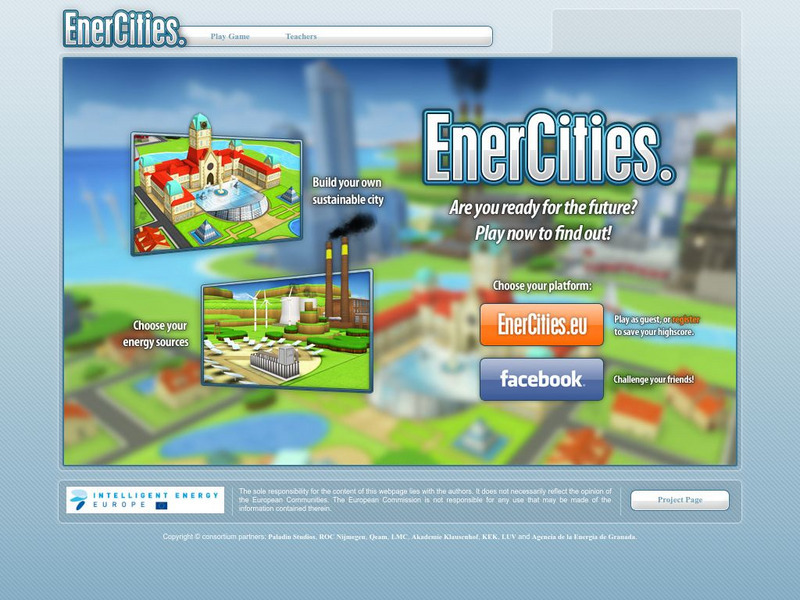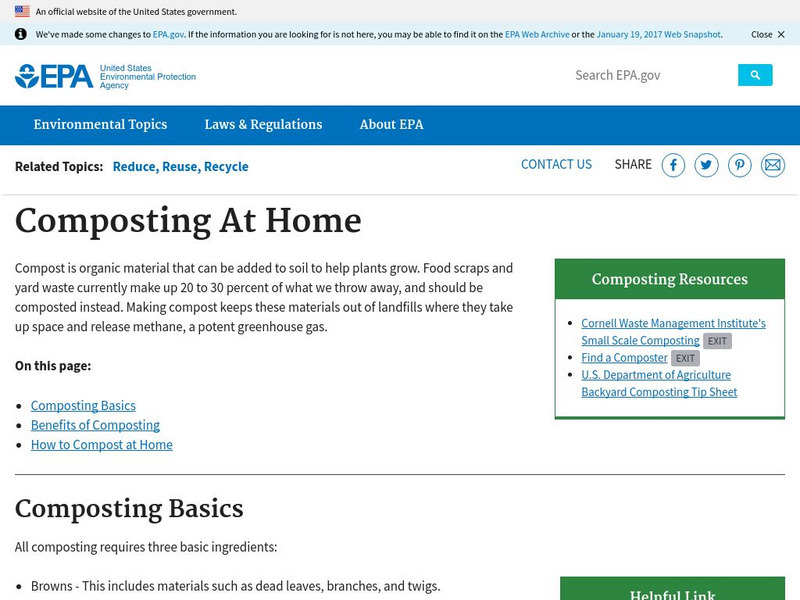TeachEngineering
Teach Engineering: A New Angle on Pv Efficiency
Students examine how the orientation of a photovoltaic (PV) panel relative to the sun affects the efficiency of the panel. Using sunshine (or a lamp) and a small PV panel connected to a digital multimeter, students vary the angle of the...
TeachEngineering
Teach Engineering: Ice, Ice, Pv!
Students examine how the power output of a photovoltaic (PV) solar panel is affected by temperature changes. Using a 100-watt lamp and a small PV panel connected to a digital multimeter, teams vary the temperature of the panel and record...
TeachEngineering
Teach Engineering: Pointing at Maximum Power for Pv
Student teams measure voltage and current in order to determine the power output of a photovoltaic (PV) panel. They vary the resistance in a simple circuit connected to the panel to demonstrate the effects on voltage, current, and power...
TeachEngineering
Teach Engineering: Concentrating on the Sun With P Vs
Students design, build and test reflectors to measure the effect of solar reflectance on the efficiency of solar PV panels. They use a small PV panel, a multimeter, cardboard and foil to build and test their reflectors in preparation for...
TeachEngineering
Teach Engineering: Design a Solar City
Students design and build a model city powered by the sun! They learn about the benefits of solar power, and how architectural and building engineers integrate photovoltaic panels into the design of buildings.
TeachEngineering
Teach Engineering: Solar Water: Heat It Up!
Students explore energy efficiency, focusing on renewable energy, by designing and building flat-plate solar water heaters. They apply their understanding of the three forms of heat transfer (conduction, convection and radiation), as...
TeachEngineering
Teach Engineering: Organic Solar Energy and Berries
Students learn about how a device made with dye from a plant, specifically cherries, blackberries, raspberries and/or black currents, can be used to convert light energy into electrical energy. They do this by building their own organic...
TeachEngineering
Teach Engineering: The Great Algae Race
In a multi-week experiment, student groups gather data from the photobioreactors that they build to investigate growth conditions that make algae thrive best.
TeachEngineering
Teach Engineering: Energy Systems and Solutions
The Energy Systems and Solutions unit brings students through the exploration of science and engineering concepts as they relate to energy issues in everyday life. Issues surrounding energy production and energy consumption provide a...
TeachEngineering
Teach Engineering: Environmental Challenges in China
Students learn about the wonderful and fascinating country of China, and its environmental challenges that require engineering solutions, many in the form of increased energy efficiency, the incorporation of renewable energy, and new...
TeachEngineering
Teach Engineering: Energy Efficient Housing
We all know that it takes energy to provide us with the basics of shelter: heating, cooling, lighting, electricity, sanitation and cooking. To create energy-efficient housing that is practical for people to use every day requires...
TeachEngineering
Teach Engineering: Photovoltaic Efficiency
Through a series of four lessons, students are introduced to many factors that affect the power output of photovoltaic (PV) solar panels. Factors such as the angle of the sun, temperature of the panels, specific circuit characteristics,...
TeachEngineering
Teach Engineering: Off the Grid
Students learn and discuss the advantages and disadvantages of renewable and non-renewable energy sources. They also learn about our nation's electric power grid and what it means for a residential home to be "off the grid."
TeachEngineering
Teach Engineering: Passive Solar Design
Young scholars are introduced to passive solar design for buildings--an approach that uses the sun's energy and the surrounding climate to provide natural heating and cooling. They learn about some of the disadvantage of conventional...
TeachEngineering
Teach Engineering: Solar Angles and Tracking Systems
Students learn about the daily and annual cycles of solar angles used in power calculations to maximize photovoltaic power generation. They gain an overview of solar tracking systems that improve PV panel efficiency by following the sun...
TeachEngineering
Teach Engineering: Concentrated Solar Power
Students learn how the total solar irradiance hitting a photovoltaic (PV) panel can be increased through the use of a concentrating device, such as a reflector or lens. This is the final lesson in the Photovoltaic Efficiency unit and is...
TeachEngineering
Teach Engineering: Solar Power
Students learn about solar energy and how to calculate the amount of solar energy available at a given location and time of day on Earth. The importance of determining incoming solar energy for solar devices is discussed.
Other
David Suzuki Foundation: Climate Solutions
People power is the key to accelerating renewable energy in our homes and throughout our country. By acting together, we can drive real change in Canada that results in cleaner air, healthier communities and sustainable energy systems.
Other
Nrdc: Composting Is Way Easier Than You Think
The NRDC breaks down how to easily achieve at-home composting. Find out what can and cannot be composted.
Other
U.s. Department of Energy: Photovoltaics
This site has an overview of PV technology, impact, system application and design. Information is provided on how to select the best solar system for various needs.
TeachEngineering
Teach Engineering: Digest Your Food!
In a multi-week experiment, student teams gather biogas data from the mini-anaerobic digesters that they build to break down different types of food waste with microbes. They compare methane gas production from decomposing hot dogs,...
TeachEngineering
Teach Engineering: Biorecycling: Using Nature to Make Resources From Waste
By studying key processes in the carbon cycle, such as photosynthesis, composting, and anaerobic digestion, students learn how nature and engineers biorecycle carbon.
Intelligent Energy – Europe
European Commission: Enercities Game
Build your own metropolis, keep it sustainable and grow you population to 200. In order to expand your city you will need to find the perfect balance between economy, environment and your citizens' well-being. Good luck!
US Environmental Protection Agency
Epa: Composting at Home
Investigate the benefits of composting and discover ways to do it easily at home.



